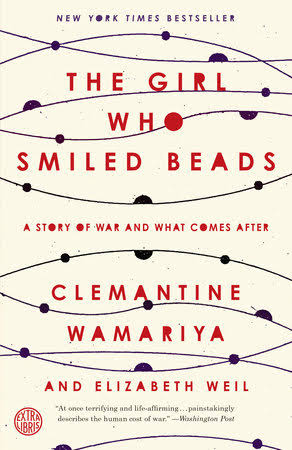
The Girl Who Smiled Beads - Book Review and Book Club Questions
Autobiography, by Clemantine Wamariya and Elizabeth Wile, about Clemantine’s experience of the Rwandan Massacre.
This is a powerful and well-written autobiography/biography sharing the story of Clemantine Wamariya. She and her sister Claire are adrift as refugees, fleeing the terror imposed during the Rwandan War. I hadn’t heard of Clemantine prior to reading the book, but it seems she became something of a ‘genocide survivor celebrity’ after sharing her story on Oprah.
When considering memoirs and biographies there tends to be an assumption that the process of writing the book will help the author come to peace with what has happened in it. – a cathartic process. What struck me most about this text is that this doesn’t seem to be the case. Even as the book comes to its conclusion and Clementine tries to make things as ‘right’ as they ever can be for her mother, she continues to seem completely troubled. There is a sense that she has gone through the worst, come out the other side, but because of that almost incomprehensible worst there can never be a best. So, whilst Clemantine can analyse and evaluate her situation and does critically review everything she has been through, she can’t quite fully come to terms with it or move forward.
The book does make for an unnerving read. There is nothing comfortable about Clemantine’s account as she repeatedly reflects on the brutality of it. There is no redemption, no forgiving and forgetting. One of the things Clemantine is troubled and confused by is how many Rwandan’s have, to some extent at least, moved forward with life (of course they have to). She finds this difficult to comprehend and the reader is exposed to the complexity of responding emotionally with any kind of rationality to such horror.
Clemantine explores the life she has created in America and illustrates how she is frequently misjudged, mistreated and misunderstood. To be truthful, whilst reading I am full of fear that I am the person doing the misunderstanding, which makes me feel a little defensive about a perhaps imagined reproach. Ridiculous eh! I feel that Clemantine resents and fears that she will always have the outsider position imposed on her yet cannot allow herself to take any other societal or personal position in the relationships she makes.
Lasting Impression of the Girl Who Smiled Beads
Ultimately, the book made me feel humbled, frightened, reflective and grateful. I love the parable of the girl who smiled beads, I love the honesty of the writing and I love being privileged to have had this ‘life story’ shared with me.
Book Club Discussion Questions for The Girl Who Smiled Beads by Clemantine Wamariya
- Clemantine suffers in a way that no child should ever have to. She can recount her emotions of fear, anger, and need to survive vividly. What do you learn about children that surprised you after reading this account?
- Rob marries Claire and has a child with her when she is only 17. He disrespects her in every way imaginable, yet there is a sense that her return to him is more than simply needing his protection. How does this fit or differ to the image you have of Claire?
- Claire and Clemantine have a troubled adult relationship. Clemantine has a fear of abandonment and Claire states she always felt alone, even in the midst of her suffering as a refugee. The Oprah reunion is looking for an ideal that doesn’t exist. Should the televised reunion have been allowed to happen?
- Clemantine and Claire have never shared with her mother exactly what happened to them. Who in the world has the most right to hear this story and why?
- Was Clemantine’s professor correct to tell her to try to be less emotional in class?
- Clemantine sums up how Rwandan people reconcile themselves to such horrendous fighting between themselves by blaming it on the colonization of the country by Belgium. Do you agree with this interpretation? Why or why not?
- Even after the family have all made new lives in America the autobiography does not have a ‘ we all live happily ever after’ feel to it. What was the predominant emotion you felt after finishing the book?
- How is blame central to Clemantine’s story?
- Clemantine is appalled by the behaviour of the billionaire, supposed philanthropist for failing to understand the reality of refugee situations. He sees the desire to preserve photographs as trivial. She has no time for false heroes and rescuers. Is her judgement of the billionaire fair and if so, why or why not?
- Clemantine acknowledges that Mrs Thomas loved her unreservedly as her ‘African daughter. She provided wonderful opportunities for Clemantine yet she plays only a small part in the narrative. In addition, Clemantine voices that she is constantly searching for replacement mother figures even though she has found her own biological mother. Explore this.

Extra Book Club Discussion Questions for Clemantine Wamariya's The Girl Who Smiled Beads (if you haven’t read the book.)
- Through Clemantine’s personal story we learn an immense amount about war. How powerful a tool is ‘story telling’ in helping us understand history? Do you have any examples you would like to share of where fiction or biography helped you understand conflict?
- Clemantine’s family suffering is constantly present in their lives and continues to impact negatively on their family dynamic. How important is it to you to stay connected in family?
- Claire and Clemantine’s status as a ‘refugee’ was never accepted by Claire, who was determined to hustle to make money and be independent. She wouldn’t steal or sell herself despite her circumstances being unimaginably dire. Claire is quite critical of ‘non-refugees’ perception of refugees as people being somehow to blame for their situation and being weak and inferior. Explore whether you have ever fallen into the trap of feeling pity, but not understanding, towards refugees.
- Autobiographies have a particular type of resonance because they are about real people. Discussing your opinion of a fictional character’s behaviour is quite different to discussing a real person’s actions. What do you like and dislike about autobiography as a genre?
- What does displacement mean to you?